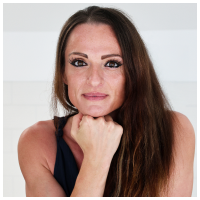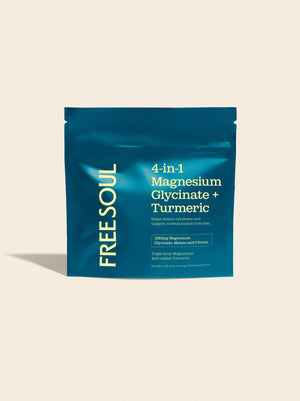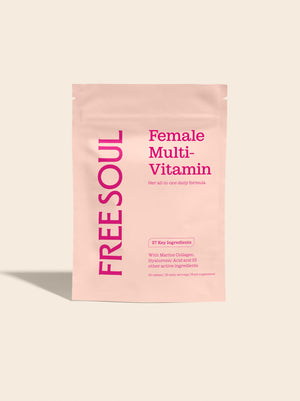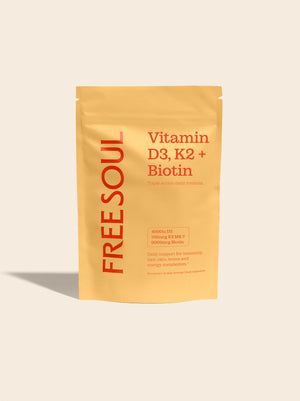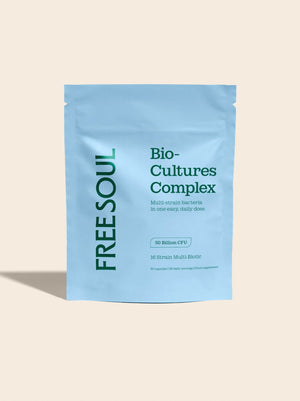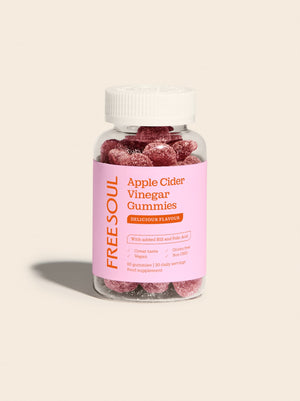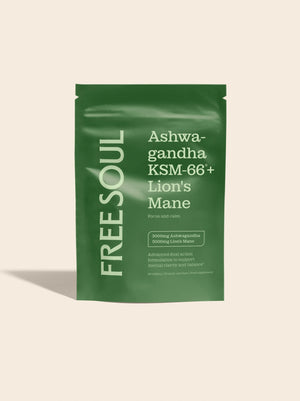Often, that’s a sign it’s time to take a look at what’s happening on the inside. “If you’re looking for nutrition that actually makes a difference for your hair, skin, and nails, then Biotin and Vitamin D are one of the best combinations,” says Natalie Rouse, Registered Nutritionist (RNutr) and Head of Nutrition at Free Soul. “Together, they can support these areas as part of a balanced, nutrient-rich routine”.
What is Vitamin D?
Vitamin D is a fat-soluble vitamin that’s stored in your body’s fat cells. There are two main types found in your body: Vitamin D2 and Vitamin D3. “You can get some Vitamin D from diet, in foods like oily fish and egg yolks, and fortified products,” explains Natalie. “However, the majority of our intake comes from sunlight, UVB exposure, which helps the body produce Vitamin D3. This form is also more bioavailable, meaning it’s easier for your body to absorb and use than Vitamin D2”.
That’s why many people in the UK tend to have low levels in the winter, when sunlight is limited. Because Vitamin D supports a normal hair growth cycle, skin regeneration, and repair, they’re often the places where signs of deficiency first appear.
Want to learn more? Check out our Vitamin D for Women blog for a deeper dive.
What is Biotin?
Biotin, also known as Vitamin B7, is a water-soluble vitamin involved in a number of metabolic processes. It helps your body convert nutrients into energy and synthesise amino acids, which are then used to produce keratin, the structural protein that forms your hair, skin, and nails.
It can be found in some food sources, like organ meats, fish, eggs, nuts, and seeds, but depending on your diet, it's possible you’re not getting enough from food alone. “Keratin is essential for your hair, skin, and nails. It provides strength, elasticity and protection,” says Natalie. “A lack of biotin may show up in hair thinning, brittle nails, and skin rashes around openings like the nose and mouth.”
The benefits of Vitamin D3 & Biotin together
When taken together, Vitamin D3 and Biotin complement each other beautifully to support you from within. Here’s how they can help:
Support healthy hair growth
Vitamin D contributes to normal follicle function and a healthy hair growth cycle. Meanwhile, Biotin contributes to the production of keratin, the structural protein that forms your hair. Together, Biotin and Vitamin D for hair growth are the ultimate power duo for enviable locks.
Help maintain strong, healthy nails
Biotin is also vital for stronger, less breakage-prone nails. Biotin’s role in keratin formation helps reduce nail brittleness, so whether you love a fresh manicure or prefer to keep it natural, your nails will thank you.
Contributes to the maintenance of normal skin
Biotin supports the metabolism of fatty acids, which are important for skin hydration and maintenance of the skin barrier. Vitamin D is also needed for skin cell turnover and regeneration, which can help defend against premature ageing and dryness.
Support steady energy
Both vitamins play a role in your body’s energy metabolism. Biotin helps break down carbohydrates, fats, and proteins into usable energy. Vitamin D helps support muscle strength and normal neurotransmitter function, which can help reduce fatigue.
Who should consider taking Biotin + Vitamin D3?
Some people struggle to get enough Vitamin D3 and Biotin from food and sunlight alone. You might want to consider supplementation if any of the following apply:
- You’re not getting much sunlight – Between October and March, Vitamin D levels tend to dip in the UK due to shorter daylight hours
- You spend a lot of time indoors – Whether you’re working night shifts or aren’t able to get out much, less sunlight means less Vitamin D
- You follow a plant based diet – Vitamin D3 and Biotin are most easily obtained from animal products, so if you eat mostly plants, you may need to be mindful about getting enough
- You want to support beauty from within – If you, like us, believe radiance starts from the inside, adding Vitamin D3 and Biotin to your routine is a smart move
Government data indicates that 1 in 6 adults in the UK have lower-than-recommended Vitamin D levels. A supplement that includes Vitamin D3, and other supportive nutrients like Biotin, can help you maintain healthy levels year-round.
Signs you might be deficient
Worried you’re not getting enough Biotin and Vitamin D3? It’s not always easy to tell, but here are a few commons signs to keep an eye on:
- Low energy – Low Vitamin D and Biotin levels can affect energy metabolism and leave you feeling more fatigued
- Weakened muscles – A drop in strength and endurance, especially in your arms and legs, may be due to low Vitamin D
- Hair thinning or shedding – Both Biotin and Vitamin D are connected to a healthy hair growth cycle, so a deficiency may show itself in your tresses
- Mood changes – Vitamin D plays a role in mood-regulating neurotransmitters like dopamine and serotonin
- Brittle nails – If your nails break easily, it could be a sign your Biotin levels are lacking
- Dry skin – Both Biotin and Vitamin D are important for skin hydration and maintenance of the skin barrier
How to add them to your routine
You can naturally boost your levels through diet. Organ meats, sweet potatoes, nuts, and seeds are good sources of Biotin, while oily fish, eggs, yolks, and fortified foods (like some cereals and plant-based milks) are good options to top up your Vitamin D.
However, many people struggle to get enough Vitamin D from diet alone, and in the UK, limited sunlight in autumn and winter makes it even harder to maintain healthy levels. That’s why supplementation can be a good option for many people.
When choosing a supplement, look for:
- Vitamin D3, the form that’s easiest for your body to utilise.
- Up to 100 micrograms of Vitamin D a day, the maximum amount recommended by the NHS
- A meaningful dose of Biotin, with a supplement ideally containing between 5,000 - 10,000mcg
- Complementary nutrients that support your hair, skin, and nails
Free Soul’s Vitamin D3 + K2 and Biotin contains 4000iu (100 mcg) Vitamin D and 6000mcg Biotin. We’ve also included Vitamin K2, which helps direct calcium towards where you need it most, your teeth and bones.
Want to take your glow-up routine even further? Try stacking Vitamin D3 + K2 with:
- Marine Liquid Collagen – for skin and joint support
- CreaGlow – for an extra hydration and collagen boost
- 4-in-1 Magnesium + Turmeric – for baseline nutrition support
However you choose to incorporate it into your wellness ritual, there’s no doubt that Biotin and Vitamin D together are a smart choice for supporting your hair, skin, and nails from the inside out.
